Social media suspicions
We’re all encouraged to stay safe online. Be careful who you speak to in case you put yourself in danger. Be careful what you write in case it damages your future. Be careful what you share.
Read that last one again. Be careful what you share. Some of this stuff is kinda obvious. Do you know the person you’re about to share your address with? Could the thing you’re about to share put you or someone else at risk of harm. Is it negative or mean?
Think before you share
But think before you share also includes things that might sound harmless – or even helpful.
A social worker wrote this article about the dangers of sharing missing children’s posts. At first glance, you’d think this kind of post was a good thing. But as you can see from the article, it’s not always.
The social worker explains that some parents who’ve had children removed because they weren’t safe living at home have created missing children posts on social media to track them down.
So you can see how something that you thought was ok to share could put someone in danger in just a few clicks.
Toxic relationships & social media
If you’ve left a toxic relationship and want to put some distance between you and your ex-partner, make sure your social media activity doesn’t allow them to monitor your movements. Same goes if you’re friends with someone in that position.
If you’re in an unhealthy or toxic relationship and you’re not ready to leave yet, keep an eye on your location settings so your partner can’t keep tabs on you while you’re apart.
Check out the information in posts before you share them. Only share ‘missing person’ posts from genuine police appeals or from authorised charities acting on police guidance.
If you see someone featured in a ‘missing’ post and you’re suspicious about the motives of the person who created it, contact the police – not the account user. Give the police chance to safeguard the person mentioned in the post if they need to.



